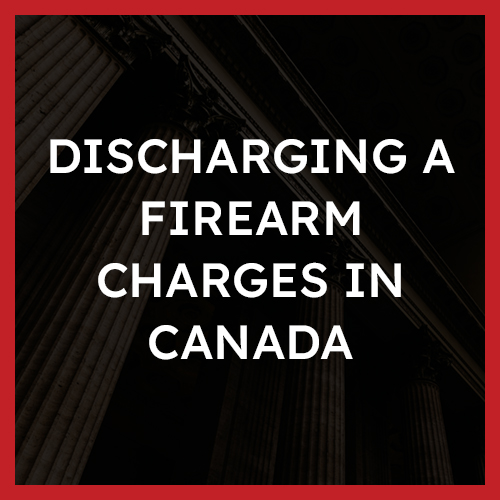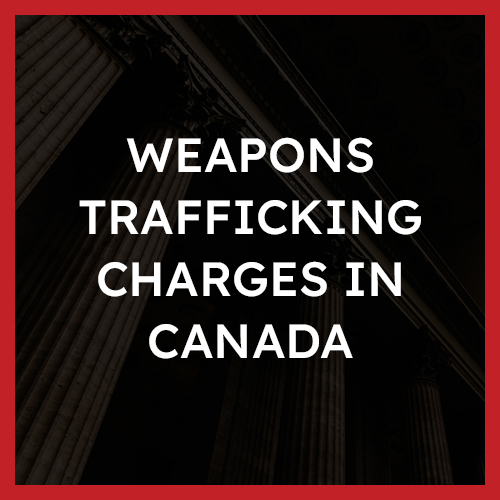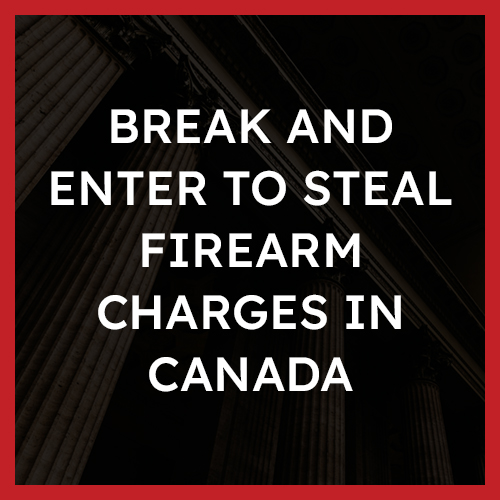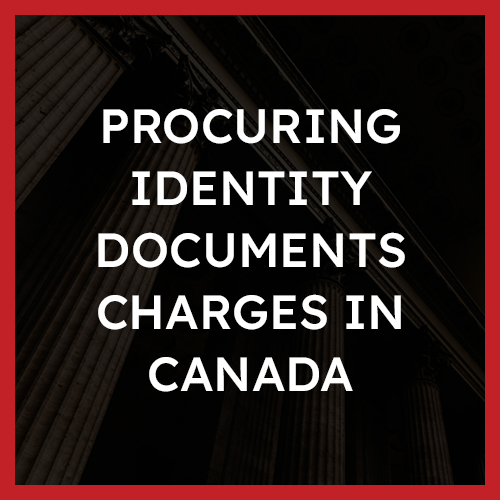Discharging a Firearm (s. 244, 244.1, 244.2) Charges in Canada: Offences, Defences, Punishments
What is a discharging a firearm charge?
 Offences relating to discharging a firearm are found in Part VIII of the Criminal Code concerning “Offences Against the Person and Reputation”. These offences can be found under s.244, 244.1, and 244.2 of the Criminal Code.
Offences relating to discharging a firearm are found in Part VIII of the Criminal Code concerning “Offences Against the Person and Reputation”. These offences can be found under s.244, 244.1, and 244.2 of the Criminal Code.
Offences under s.244, 244.1, and 244.2 of the Criminal Code are straight indictable offences, which means that the Crown cannot elect to proceed otherwise.
Examples
- Shooting at someone with a firearm
- Shooting someone with a firearm and to wound, maim, or endanger the life of a victim.
- Discharging a firearm while being reckless of another life or safety
Defences
- Identity
- Essential elements of the offence are not met;
- Any applicable Charter defences.
Punishments
For offences under s.244, 244.1, and 244.2 of the Criminal Code the maximum penalty is 14 years in jail.
For offences under s. 244 and 244.2 of the Criminal Code the minimum penalty is:
- five years in jail;
- or seven years in jail with any prior convictions.
- Where no aggravating factors are present= four years in jail.
Overview of the Offence
Discharging a firearm is outlined in the criminal code.
Discharging firearm with intent
244 (1) Every person commits an offence who discharges a firearm at a person with intent to wound, maim or disfigure, to endanger the life of or to prevent the arrest or detention of any person — whether or not that person is the one at whom the firearm is discharged.
Punishment
(2) Every person who commits an offence under subsection (1) is guilty of an indictable offence and liable
(a) if a restricted firearm or prohibited firearm is used in the commission of the offence or if the offence is committed for the benefit of, at the direction of, or in association with, a criminal organization, to imprisonment for a term not exceeding 14 years and to a minimum punishment of imprisonment for a term of
(i) in the case of a first offence, five years, and
(ii) in the case of a second or subsequent offence, seven years; and=
(b) in any other case, to imprisonment for a term of not more than 14 years.
Subsequent offences
(3) In determining, for the purpose of paragraph (2)(a), whether a convicted person has committed a second or subsequent offence, if the person was earlier convicted of any of the following offences, that offence is to be considered as an earlier offence:
(a) an offence under this section;
(b) an offence under subsection 85(1) or (2) or section 244.2; or
(c) an offence under section 220, 236, 239, 272 or 273, subsection 279(1) or section 279.1, 344 or 346 if a firearm was used in the commission of the offence.
However, an earlier offence shall not be taken into account if 10 years have elapsed between the day on which the person was convicted of the earlier offence and the day on which the person was convicted of the offence for which sentence is being imposed, not taking into account any time in custody.
Sequence of convictions only
(4) For the purposes of subsection (3), the only question to be considered is the sequence of convictions and no consideration shall be given to the sequence of commission of offences or whether any offence occurred before or after any conviction.
Causing bodily harm with intent — air gun or pistol
244.1 Every person who, with intent
(a) to wound, maim or disfigure any person,
(b) to endanger the life of any person, or
(c) to prevent the arrest or detention of any person,
discharges an air or compressed gas gun or pistol at any person, whether or not that person is the person mentioned in paragraph (a), (b) or (c), is guilty of an indictable offence and liable to imprisonment for a term not exceeding fourteen years.
Discharging firearm — recklessness
244.2 (1) Every person commits an offence
(a) who intentionally discharges a firearm into or at a place, knowing that or being reckless as to whether another person is present in the place; or
(b) who intentionally discharges a firearm while being reckless as to the life or safety of another person.
In order for the Crown to secure a conviction they must prove, beyond a reasonable doubt, that the actus reus and the mens rea element of the offences are met.
The Guilty Act (Actus Reus)
For the purposes of s.244, the actus reus that the Crown must prove, beyond a reasonable doubt, is that:
- You discharged a firearm at another person
For the purposes of s.244.1, the actus reus that the Crown must prove, beyond a reasonable doubt, is that:
- You discharged an air or compressed gas gun or pistol.
For the purposes of s.244.2, the actus reus that the Crown must prove, beyond a reasonable doubt, is that:
- You discharged a firearm into or at another place (s.244.2(a)); or
- You discharged a firearm (s.244.2(b)).
The Guilty mind (Mens Rea)
For the purposes of s.244, the mens rea that the Crown must prove, beyond a reasonable doubt, is that:
- You intended to wound, maim or disfigure the complainant.
For the purposes of s.244.1, the mens rea that the Crown must prove, beyond a reasonable doubt, is that:
- You intended to wound, maim, or disfigure another person; or
- Endanger the life of another person; or
- Prevent the arrest or detention of another person.
For the purposes of s.244.2, the mens rea that the Crown must prove, beyond a reasonable doubt, is that:
- You knew or were reckless to whether another person was present in the place (s.244.2(a)); or
- You were reckless as to the life or safety of another person (s.244.2(b)).
Defences
A strong defence depends entirely on the individual circumstances of your case. However, the following defences may be applicable:
Identity
The Crown needs to prove identity beyond a reasonable doubt. This means that the Crown must prove that it was you who committed the offence. This can often be difficult if there are no witnesses if there were conditions present that prevented a witness from identifying you, or if the offence was captured by poor-quality surveillance footage. Sometimes mistakes do happen, the authorities could have made a mistake in identifying you as the perpetrator based on the poor quality of the footage. Your defence lawyer may be able to argue that the Crown cannot definitively prove that it was you who committed the offence, resulting in an acquittal.
Essential Elements of The Offence Are Not Met
In order for the Crown to convict you of an offence, the actus reus and the mens reas of the offence need to be proven beyond a reasonable doubt. If the Crown is unable to do so, the essential elements of the offence are not satisfied, and you cannot be convicted of the offence.
Applicable Charter defences
The Charter sets out your rights before and after arrest. In the event the police fail to abide by these rights, you may have an applicable Charter defence to your charge:
Common Charter breaches include:
- Section 8- Right to be secure from search and seizure;
- Section 9- Right not to be arbitrarily detained;
- Section 10- Right to be informed of reasons for detention or arrest:
- Section 11- General: legal rights apply to those “charged with an offence”
- Section 12- Cruel and unusual treatment or punishment
If any of your charter rights have been violated, you may be in a position to have any evidence obtained during the breach excluded.
Punishments
For offences under s.244, 244.1, and 244.2 of the Criminal Code the maximum penalty is 14 years in jail.
For offences under s. 244 and 244.2 of the Criminal Code the minimum penalty is:
- five years in jail;
- or seven years in jail with any prior convictions.
- Where no aggravating factors are present= four years in jail
However, for offences under s.244.1 of the Criminal Code other dispositions may be available to you such as the following:
- Suspended sentence; or
- Stand alone fine.
Frequently Asked Questions
Can you go to jail for Use of Firearm in Commission of an Offence?
Yes, you can go to jail for use of a firearm in the commission of an offence. The maximum penalty is up to 14 years in jail.
Is Use of Firearm in Commission of an Offence a serious offence?
Use of a firearm in the commission of an offence is a serious offence. Even for s first offence, you can receive a harsh sentence that could result in jail time.
Is Use of Firearm in Commission of a summary or indictable Offence?
Offences under s.244, 244.1, and 244.2 of the Criminal Code are straight indictable offences, which means that the Crown cannot elect to proceed otherwise.
Published Decisions
R v Roberts, 2022 ABKB 748
The Accused was charged with striking and driving over SV with a vehicle, striking SV with a rifle stock, and discharging a .22 calibre rifle into BP, thereby committing: (1) one count of discharging a firearm with intent to wound, maim, disfigure or endanger the life of BP contrary to section 244(1) of the Criminal Code; (2) one count of aggravated assault with a weapon against BP contrary to section 268(1) of the Criminal Code; (3) operating a conveyance in a manner that was dangerous to the public, resulting in bodily harm to SV contrary to section 320.12(2) of the Criminal Code; (4) one count of aggravated assault with a weapon against SV contrary to section 268(1) of the Criminal Code; and (5) one count of assault with a weapon against SV contrary to section 267(A) of the Criminal Code. The Accused was arrested and detained by members of the Royal Canadian Mounted Police (“RCMP”) at his parents’ rural property where an arresting officer elicited the whereabouts of a rifle in violation of his 10(b) rights. After speaking with duty counsel at the RCMP detachment that evening, the Accused was subjected to a gunshot residue kit. He was not given an opportunity to speak with his counsel of choice until next morning. The Accused argued that the whereabouts of the rifle, the results of the gunshot residue kit, and his cautioned statements were elicited by police in violation of his 10(b) rights and should be excluded from evidence in his trial pursuant to section 24(2) of the Charter.
You can read the full decision here.
R v Powderface, 2021 ABPC 34
The accused was charged with multiple sections of the Criminal Code, which included s.244(a) of the Criminal Code as he did with intent to wound, maim or disfigure, unlawfully discharge a firearm at the victim. A shooting occurred at the material time when the accused shot the victim in the left foot. Cochrane RCMP conducted gunshot residue testing on the accused and collected samples from each side the accused’s face and hand. In this case, there was no question that the victim was shot, the question was whether the Crown proved beyond a reasonable doubt that the accused shot him. The court concluded that it was more likely and probable that the accused was the shooter, but that was not enough for a conviction. Specifically, the court did not have a settled belief of what occurred; specifically, the court did not have a settled belief the accused was the shooter. As such, the Crown did not prove the offences beyond a reasonable doubt and the accused was acquitted of all charges.
You can read the full decision here.
R v Hills, 2020 ABCA 263
In this case, the respondent, Mr. Hills, pleaded guilty to four charges including section 244.2(1)(a) of the Criminal Code, which under section 244.2(3)(b) carries a mandatory minimum penalty of four years of imprisonment. Mr. Hills alleged that this minimum penalty violates section 12 of the Charter by requiring the imposition of a penalty that will in some circumstances constitute cruel and unusual punishment. The sentencing judge held the mandatory minimum sentence violated the right not to be subjected to cruel and unusual punishment as enshrined in section 12 of the Charter and declared the penalty provision to be of no force and effect. The Crown appeals this finding and the declaration of invalidity as well as the three-and-a-half-year sentence imposed. Ultimately, the court allowed the appeal. The declaration of invalidity of the mandatory minimum penalty provision was set aside and the sentence for the section 244.2(1)(a) offence was increased to four years.
You can read the full decision here.
About The Author
Ask A Question
We endeavor to respond to questions within 24 hours. If your matter is urgent, please call our office or submit a request for a free consultation.







